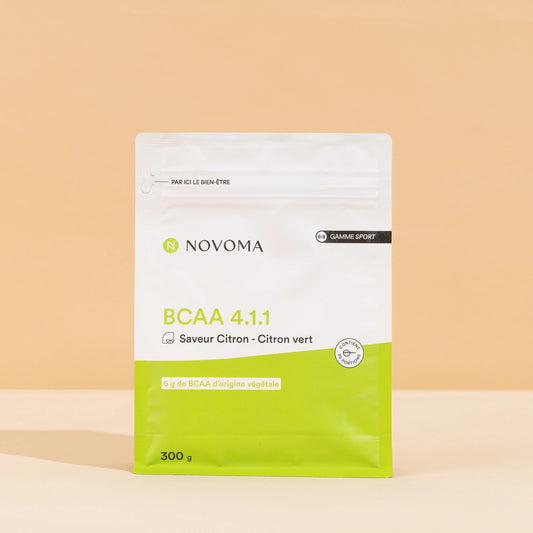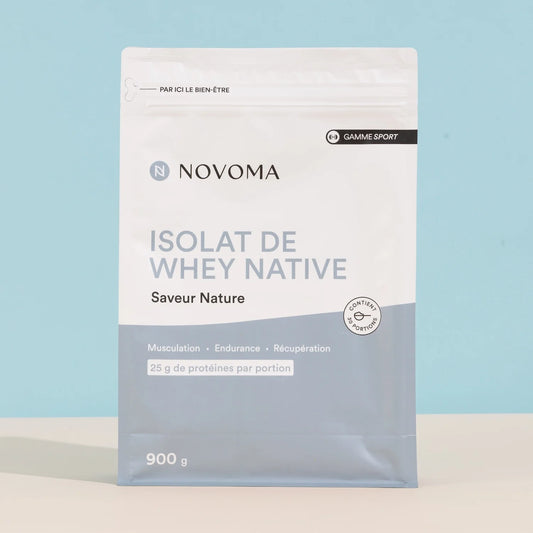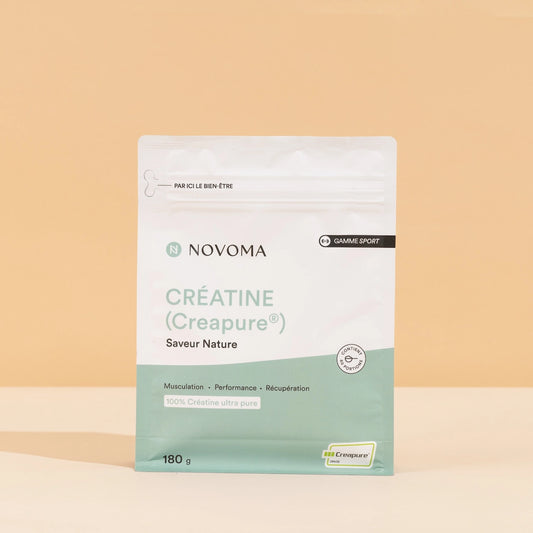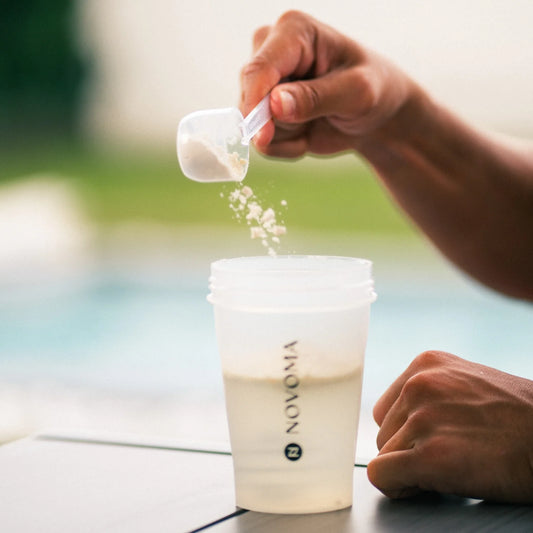
How to Choose the Best Whey Isolate? A Step-by-Step Guide to Making the Right Choice
Summary
Between incomprehensible labels, very (very!) variable prices and dazzling marketing promises: finding the right whey isolate can quickly turn out to be an obstacle course!
And that's normal. We're not all nutrition experts, just top athletes preparing for sports competitions (even if some put in a similar amount of energy).
In this article, we'll explain how to find the essential information, avoid common pitfalls when making your choice, and find the best whey isolate to boost your performance and optimize your recovery. 🏋️
What is whey isolate and what makes it so popular?
Before we get into the details, let's lay the groundwork. What is whey isolate ? With its high protein content and infinitesimal amounts of fats and carbohydrates, whey isolate seems like THE ideal dietary supplement.
But is that really the case? Spoiler: yes, provided you choose the best one... for you!
Definition: What is whey isolate?
Whey isolate is simply a form of whey protein obtained from milk.
Unlike its cousin, whey concentrate, whey isolate is obtained in a more advanced way: the more thorough filtration process eliminates almost all fat and sugar residues, including lactose.
🏋️ Result? Whey isolate comes in the form of a powder that is very rich in protein, low in calories and easily assimilated by the body. Ideal for people looking to increase their protein intake without compromising their diet (or impacting comfort and digestion time ).

What is the difference with other types of whey sold on the market?
More common and less expensive, why not simply opt for concentrated whey, which is more accessible and just as widespread?
💡 Good to know : Whey protein concentrate isn't usually labeled that way on the package or jar. It's easy to spot! Just turn the product over and read the label. You'll usually see "whey protein concentrate" or "whey/milk protein concentrate," often accompanied by emulsifiers and other ingredients.
Hold on tight: the major difference lies in the protein content, quality and assimilation:
👉 Whey isolate offers over 90% high-quality protein, while whey concentrate only contains 70-80% on average;
👉 Whey isolate is more digestible, as it contains almost no traces of lactose, which is a clear advantage for intestines sensitive to dairy products;
👉 Whey isolate is purer, and generally free of unnecessary additives and ingredients to improve palatability (sweeteners, emulsifiers, colorings, etc.).
What are the benefits of whey isolate?
If so many athletes swear by whey isolate, it's not only for the composition on the label, but also its benefits on their performance :
✅ Better absorption by the body: whey isolate (or lactoserum isolate) is better assimilated by the body (during training and in a similar context) than concentrated proteins. It is ideal as a post-workout supplement to ensure rapid intake directly into muscle tissue;
✅ Optimal recovery and purer proteins: the microfiltration process allows the integrity of amino acids to be preserved, while minimizing the intake of fats and carbohydrates, already provided by food. A sports recovery that goes to the essentials, without superfluities;
✅ Excellent digestive tolerance: the absence of lactose (sugar contained in milk) prevents any risk of digestive discomfort, which means more effective sessions, especially if you consume whey before training!
✅ Maintain and increase lean mass: whatever your goals (drying, muscle growth, constant protein intake), whey isolate focuses on what's necessary: essential amino acids to benefit your performance.
In short, whey isolate allows you to gain muscle mass, optimize your training and your recovery, without having to track possible nutrients on the product label.
➡️ For the more curious: go to this article to learn more about whey isolate
What criteria should you check to find the best whey isolate?
If you're as convinced as we are that whey isolate is right for you, you still need to know how to choose the best one. And between you and me, not all whey isolates are created equal! Here are the essential criteria to consider.
Protein content: minimum 80%, not less
The first thing to check on the label is the protein content. A good whey isolate should contain at least 80% protein, ideally more than 90%.
☝️Beware of products that display lower percentages: they often contain more sugars and fats than you think.
Ingredient quality: where does your whey come from?
“Let food be thy medicine” provided that you are on the lookout for its origin (it’s a gift, it’s for us!)
You care about what you put in your body, and that's normal: ingredient traceability is a determining factor in quality.
👉 Our advice: choose whey made from milk from cows raised outdoors and fed on grass. This type of production guarantees a purer protein and often richer in amino acids. Not to mention that it is a responsible and ethical choice, which supports environmentally friendly agricultural practices! 🌱
AFNOR standard (EN 17444): a crucial guarantee for athletes
You may be wondering what the AFNOR EN 17444 standard is?
This is a certification relating to “foodstuffs intended for athletes and food supplements, with a view to limiting the risk of the presence of substances prohibited by the World Anti-Doping Agency”.
This labeling on a product ensures the absence of doping substances. Whether you're a professional athlete or simply a serious sportsperson, this certification is a guarantee of safety, especially when you consider the risks associated with doping.

Amino acid profile: look for BCAAs
BCAAs (Branched Chain Amino Acids) are essential for muscle recovery and protein synthesis.
A good whey isolate should contain a significant amount of BCAAs, at least 5 to 6 g per serving. BCAAs are very useful for gaining mass , especially if you do bodybuilding or endurance sports, because they help repair muscle fibers damaged during exercise.
Sweeteners: natural is better
The famous sweeteners that bring that delicious side that we appreciate so much... If some manufacturers use artificial sweeteners like aspartame or sucralose, it is better to choose a whey isolate flavored with natural alternatives like stevia.
👉 Not only are these safe to use, but they also avoid that unpleasant chemical aftertaste. Purists among you will want to opt for the neutral versions!
No unnecessary additives: a short composition or nothing
Last tip: turn the product over and check the ingredient list. A quality whey isolate should have a simple and effective composition, as short as possible! Avoid products containing artificial colors, flavors, or unnecessary thickeners.
Mistakes to avoid when buying whey isolate
With so many options available, mistakes can easily happen. Here are some common mistakes and how to avoid them to ensure you only stock the best whey on your shelves!
Relying solely on price
Do you know the adage “if it’s free, you’re the product” ? 😒
Sad but true: A cheap whey isolate may seem like a good deal, but it often hides quality flaws. Cheap brands compensate for the low cost by using protein from questionable sources and/or the presence of unnecessary additives.
The product may not meet nutritional needs or even slow down your athletic progress!
Ignore the label
Have you ever tried reading a whey isolate label? It can be a bit of a decoding exercise!
👉Take the time to check the origin of the ingredients, the protein content, and the presence of additives. A good whey isolate should be clear about its composition. If the label is too complicated, move on!
Neglecting the Afnor standard
Some amateur athletes think that this standard does not apply to them. Wrong!
👉Even if you're not preparing for the next Olympic Games, the Afnor standard ensures that your whey is free from banned and potentially dangerous substances.
We recommend you
Native Whey Isolate
Formula enriched with digestive enzymes for easier digestion.
- ✅ Undenatured native protein
- ✅ Milk from French pasture cows
- ✅ High protein and BCAA content
- ✅ Compliant with anti-doping standards
Choosing a product that is not suited to your needs
Don't be tempted by whey that's too sweet or low in protein just because it tastes good.
👉 If you want to gain muscle and maximize your recovery, you need a product high in protein and low in carbohydrates. Save the fun for dessert!
Why is Novoma whey isolate ideal for you?
With all this information, you now know what to look for in a good whey isolate. At Novoma, we offer:
A native, undenatured protein
Novoma whey isolate is obtained through gentle microfiltration to preserve protein integrity and provide optimal absorption.
✅ With a concentration of 90.07% protein on dry matter (i.e. 25g per 30g serving), it is the ideal choice for demanding athletes!
Compliance with the Afnor standard (EN 17444)
Certified by the Afnor standard, Novoma whey isolate guarantees the absence of doping substances and their potential adverse effects, and an analysis of the finished product.
High BCAA content
If you're looking to optimize your workouts, this is a great asset!
✅ With 20% BCAA per serving (respectively 6g per serving for the natural flavor, 5.6g for the chocolate version and 5.7g for the vanilla) our whey isolate ensures your recovery and excellent muscle synthesis.
Enriched with digestive enzymes
Amylase, protease and lactase: These three enzymes aid digestion and maximize nutrient absorption.
✅ No more bloating or discomfort after your protein shake, you asked for it, we did it!
Quality and traceability of ingredients
✅ Produced from milk from cows raised on French pastures, our whey isolate guarantees optimal traceability and responsible sourcing : two core values of our commitments !
When and how to consume whey isolate?
When and how should you consume whey isolate to reap its benefits? This is where the difference between an effective supplement and a simple boost lies.
When is the best time to take whey isolate?
Whey isolate is a fast-absorbing protein: it should be consumed at strategic times when the body requires a rapid protein intake, particularly after a sports session .
💡 Before or after training?
The best time to consume whey isolate is after training. Whey protein, rich in essential amino acids, helps rebuild these fibers and speed recovery. If you're looking for fast results, this is the place to start.
However, some athletes choose to consume it before exercise to ensure a consistent supply of amino acids during their session. This may be an option if your last meal was several hours ago.
Outside of training: a possible alternative
You can also incorporate whey isolate into your daily routine as a snack between meals. The goal? To maintain a high protein intake to promote muscle building, or simply to fill a gap in your diet.
☝️Our tip: when you're on the go or don't have time to cook, a whey isolate shake combined with a carbohydrate snack will help prevent a drop in energy.
Upon waking: to break the fast
Another interesting option is a dose of whey isolate upon waking to provide quickly assimilated proteins after a night of fasting.
This kind of reflex helps avoid the rush on the cookies brought by your colleague at 10:30 a.m.! 😅
How to consume your whey isolate?
Nothing could be simpler. Mix a dose of whey isolate (usually between 20 and 30 grams) with about 200-300 ml of water or milk in a sports shaker, shake vigorously and it's ready!
Water is often preferred for faster absorption and lower calorie count. The milk version will add a creamy texture (and extra calories if desired).
The most creative among you will improvise smoothies, yogurts, and even homemade baking recipes using whey! Who said supplements had to be boring? 🍪
It seems that the whole process has been done to help you choose the best whey isolate. In other words, the one that meets your needs, but above all, your values.
Any questions? Don't hesitate to write to us, we're here to help!


























